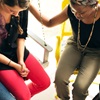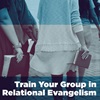Small groups are designed to welcome people from all walks of life. But what if a member cannot walk? What if a member has a severe hearing loss? What if a member has brain damage? Are small groups for them?
The answer is unequivocally yes.
All Kinds of "Broken"
Small groups are a place for the "broken" to find comfort, hope, and encouragement through the body of Christ. We often consider someone who is "broken" in relationship to an emotional or spiritual circumstance. However, small groups are for those who have been broken physically, as well.
During this past semester of small groups, I received a phone call from a mother whose son had been in an automobile accident and suffered brain damage as a result. He is in his twenties, and she desperately wanted her son to be a part of a small group and make connections with other people. She never questioned whether her son could attend a small group; she simply wanted to find a group that was right for him. I was so thankful for her love and enthusiasm for her son's life. I did place her and her son in a group, and I heard wonderful stories of love and compassion develop in this particular small group due to this young man and his mother attending. This group embraced the physically broken young man and all received blessings due to their time with him.
As a small-group coach and someone who happens to have a disability, I understand how important small groups can be for those in all walks of life. I myself have a severe hearing loss. I am completely deaf in one ear and have 60 percent loss in my right ear. When I first began attending a small group, I knew of the loss in my left ear, but I was unaware of the loss in my right ear. I told my small group about my condition, and they were very respectful—making sure I could hear the TV, making sure I could hear the discussions, and so on.
During this particular season, a friend recommended I have my hearing checked because she noticed she had to repeat herself more frequently. I did so and was told I had lost 40 percent hearing in my right ear. I did not want to be a burden to anyone, and I was embarrassed by my condition. I guess knowing I had more of a loss made me even more self-conscious about my condition, and I did not want to continue to ask people to repeat themselves or make accommodations for me. I hesitated even returning to my small group. I did tell my leaders about the new information regarding my condition, however, and they did nothing but love me. They did not give me the option to back out of the group, either, but encouraged me to come.
It was not only them, but also the members of the group who rallied around me and helped this very insecure woman feel completely secure. Everyone made sure they looked at me while speaking, were patient with me if I asked them to repeat themselves, and overall completely made me feel loved. I now have hearing aids, but how amazing it was that even without them I felt so secure, safe, and comfortable in my group.
All Kinds of Needs
Whether broken spiritually, emotionally, or physically, we all need encouragement, love, and grace. Small groups are perfect communities for the broken—no matter the type of brokenness.
As leaders, we must embrace all walks of life and encourage unity in the body of Christ—giving equal opportunity to the love Christ for all. In doing so, we allow members in our group to feel safe and secure. Loving unconditionally bolsters openness and growth for both the leaders and the members and permit's the Holy Spirit to move freely within the group.
Leaders and members of small groups have the opportunity to be the hands, feet, and voice of Christ to a community of people. And God makes no mistakes in who he joins together in a small group. No matter the type of brokenness, there is a lesson and a blessing to be gained if we remain open to all walks of life.
—Peri Sandifer is Small-Group Coordinator at The Simple Church in Bossier City, LA. Copyright 2010 by the author and Christianity Today International.









